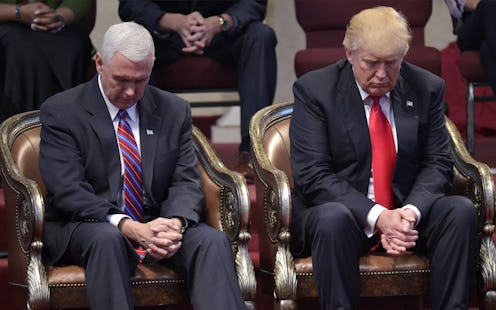News
Pence's "Mourning & Grieving" Comment Does Nothing
A reeling American public has heard it time and time again — in the wake of 2016's multiple police shootings, conservatives have doled out their "thoughts and prayers" in exchange for taking any real action against police brutality. During Tuesday night's vice presidential debate, Republican Mike Pence offered a variation on this line, crudely fighting back against the idea of implicit bias in law enforcement by telling voters that he "mourns and grieves" after these tragedies. But Pence's "mourn and grieve" response is simply the new "thoughts and prayers" — a way to suggest that he cares while still supporting policies that uphold racial bias in law enforcement. It's a convenient line with no action.
This moment in the debate came when Pence was promising to provide officers with the tools to "really restore law and order" in the face of crime. Pence argued that it was Donald Trump's commitment to this "law and order" style of policing that caused the Fraternal Order of Police to endorse the Republican for president. "They see his commitment to law and order," Pence said.
But to the contrary, the Republican argued, law enforcement also hears the supposed "bad mouthing" that follows officer-involved shootings. "... People seize upon tragedy in the wake of police shootings," Pence claimed "as a reason to use a broad brush to accuse law enforcement of implicit bias or institutional racism." He apparently has forgotten the multiple times Trump has used police shootings as an opportunity to say he "called it!" on Twitter.
So instead of investigating the mere possibility of implicit bias in law enforcement, Pence would rather accuse Clinton of "seizing on moments of tragedy" and offer no real alternative to bettering officer-civilian relations.
Yet Trump and Pence have one disturbing idea for restoring law and order. Beyond their "mourning and grieving," the Trump campaign has suggested federalizing all police departments.
In a discussion with The New York Times, the Republican nominee talked of increasing the power of law enforcement: "We’re going to put an end to jurisdictional restrictions and increase police capabilities in terms of surveillance and the use of deadly force. Not only that, we’re going to eliminate this so-called standard for probable cause; it’s very limiting and, frankly, outdated. Our police forces are going to have much more freedom in terms of who they can arrest and why."
In Trump's model for improving officer-civilian relations, we move from "mourning and grieving" to giving officers heightened power to arrest and use deadly force.
So it seems that when Trump isn't too busy tweeting opportunistic quips about police shootings, his plan is to give officers near limitless resources to continue the very thing that so often cripples community relations: the ability to arrest and use deadly force without probable cause. Doing nothing with their "thoughts and prayers" almost seems like an improvement over their actual policy.
